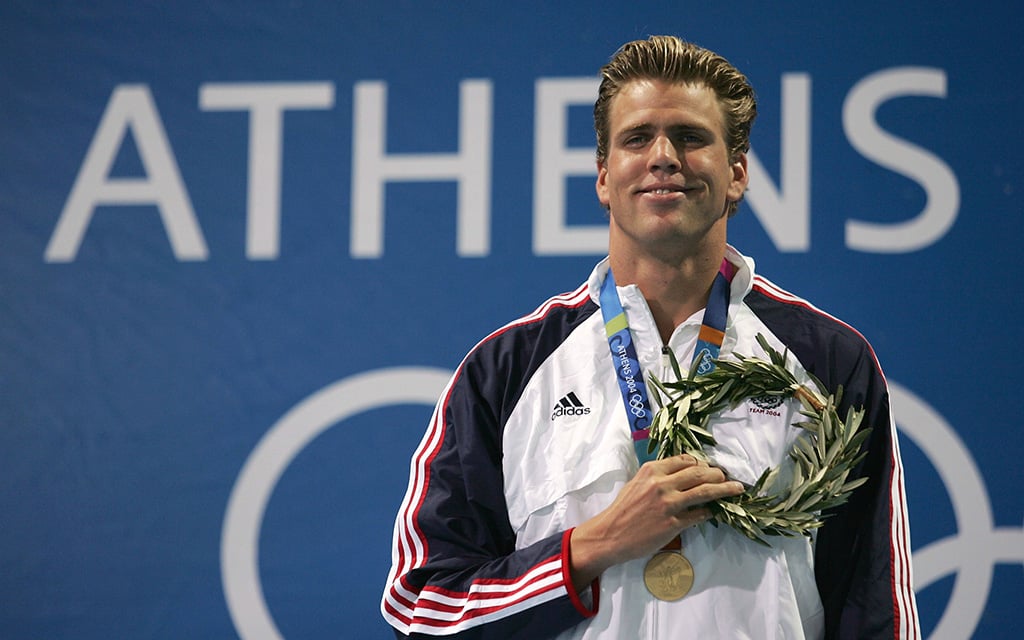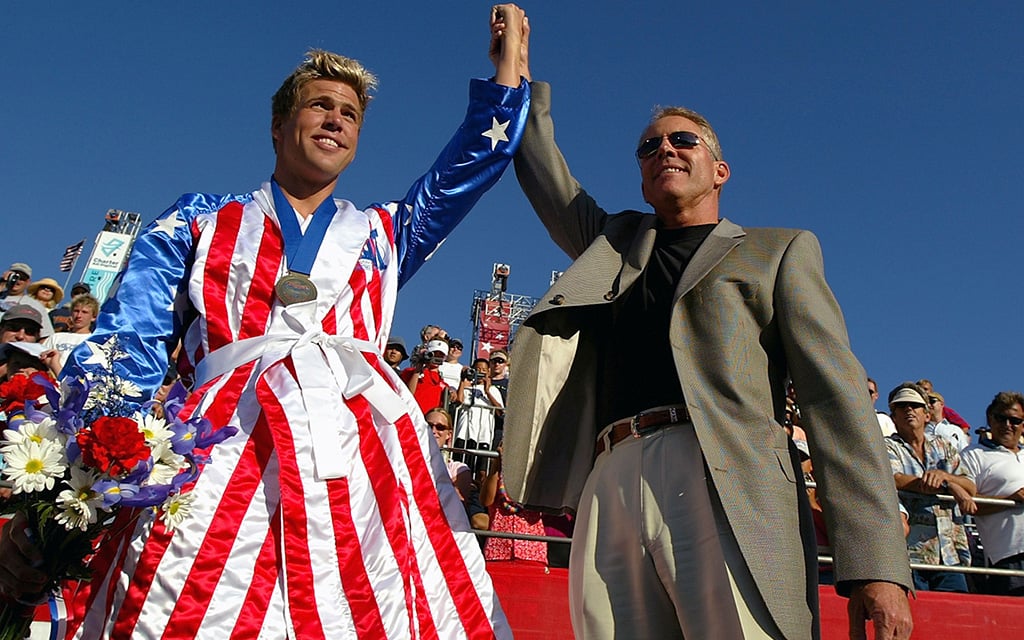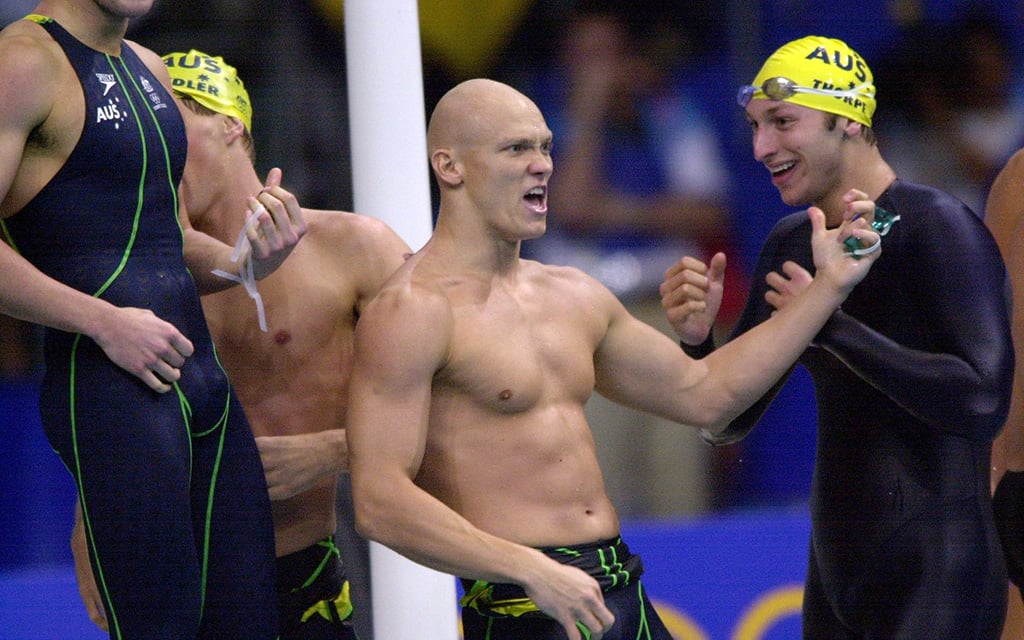PARIS – Team USA swimming will have a target on its back. After dominating the medal count in eight straight Olympic Games, the U.S. has become the hunted, and the greatest predator is Australia.
The Australia-U.S. swimming rivalry is a major storyline in Paris. In a video promotion for the Games, NBC used videos of former U.S. swimmers and newspaper headlines to hype up the rivalry. The video credited 10-time Olympic medalist and longtime Valley resident Gary Hall Jr. for having “started” the rivalry.
“I got off the airplane in Sydney for the Olympic Games and it was like ‘balky American, brash asshole Gary Hall Jr. is now off once again,’ and said that the Americans are going to smash the Australians,” Hall said.
Although those Games were 20 years ago, it fueled a rivalry that remains today.
From helping to create a foundational moment in the fierce Team USA-Australia swimming rivalry to fighting an uphill battle with Type 1 diabetes to battling a nasty stereotype assigned to his name, Hall has had to navigate life with his fists up.
Early roots
Before he was a Team USA poster boy, he was a member of a family who had a profound impact on swimming in Arizona.
His family moved to Arizona in 1982, when Hall Jr. was 8. He remembers working at the Phoenician Resort in Scottsdale, which was founded by his grandfather, financier Charles Keating, in 1985.
From a young age, Hall Jr. worked at club, taking on positions inluding golf course cart driver, busboy and golf club polisher. He also helped poured concrete to construct the iconic luxury swimming pool and remembers helping build the long water slide.
“How many people in Phoenix have gone down that thing?” Hall joked.
Keating not only built The Phoenician resort, however. After buying an abandoned elementary school north of downtown Phoenix that was once part of the Madison School District, he ordered a pool to be built on the property.
That pool became the Phoenix Swim Club – a hub for over 300 competitive swimmers, 200 masters swimmers and dozens of children.
“It was a great place for the kids to grow up. We were very fortunate,” Hall Sr. said.
Hall Jr. trained there for years, swmming alongside future Olympian Anthony Ervin, and saw many now-famed coaches got their starts, including Mike Bottom (who now coaches at the University of Michigan and was an Olympic swim team coach), Brent Rutemiller (a famed Arizona coach who was the publisher of Swimming World Magazine) and Eric Hansen (who was the head coach of the University of Arizona swim team).
That’s not the only Valley swim club that started because of the Hall family. In 1998, Hall Jr.’s aunt and uncle, Kathy and Bob Hubbard, founded the Hubbard Family Swim School, which now operates four Valley-wide locations and offers swim lessons to hundreds of kids.
Hall Jr. initially committed to swim at the University of Texas with legendary swim coach Ed Reese. After his freshman year, Hall Jr. transferred to the University of Arizona, training in Tucson, where he trained to later become an Olympian.
Little did he know what was to come.
Cornerstone of rivalry
In the scheme of Olympic history, Hall is widely known for provoking the Australian swim team before the 2000 Games in Sydney, where his anchor swim in the 4×100 freestyle relay got Australians’ blood boiling.
Heading into those Games, Team USA had never lost the 4×100, one of the most popular and high-pressure swim events because it’s one of the last and it’s one of the few team swims.
The crowd at Sydney Olympic Park Aquatic Centre was passionate even though Team Australia wasn’t favored to win. Hall, the anchor of the 1996 relay team that won first place in the event, was determined to return to the summit again, playing the role of anchor swimmer. Like that 1996 relay team, the 2000 relay team was favored to win. Unlike the 1996 Games in Atlanta, however, Hall was swimming in enemy territory.
What Hall didn’t know was that he was entering a firestorm of media noise when he arrived in Australia.
Weeks before those 2000 Olympic Games, Hall had been enlisted by CNN to write an article, which has since been scrubbed from CNN’s database, about the U.S. Olympic swim trials that took place in Indianapolis. Hall, fresh off winning a gold medal in the 50-meter freestyle, in which he broke the American 50-meter free record in 21.76 seconds and punched his ticket to Sydney, jumped on the opportunity to congratulate his team and root them to victory.
In the article, Hall wrote, “My biased opinion says that we will smash them like guitars,” in reference to the Australian team. That sentence didn’t sit well with Australian media.
By the time Hall hopped off the plane in Sydney, Australian newspapers had printed his face onto front pages with headlines like “WE WANT TO SMASH AUSSIES: New American taunt fuels swim rivalry.”
The Team USA-Team Australia swim rivalry had been intense for decades before that, but Hall’s words were the fodder the Australian media jumped on. And Hall was the perfect candidate to build a campaign against.
Red, white and blue was in Hall’s blood – his father had swam for Team USA in three Olympics, so his family was fueled by American pride. Hall was also showy about his fandom, as he would often wear red, white and blue shorts (which his father calls his “Rocky Balboa shorts”) over his swimsuit and bang on his chest before competing.
Hall swam well before the 4×100 event. He took home first place in the 50 freestyle and bronze in the 100 freestyle. Team USA as a whole was also dominating the medal count as they had in previous years, medaling 27 times before the 4×100.
Team USA was on the path to yet another comfortable Olympics victory, but the 4×100 freestyle relay still loomed. The event was one of the last possible chances the world had to steal a gold medal from the U.S.
The crowd of over 17,000 people was loud, Hall recalls. With Team Australia’s and Team USA’s relay teams positioned in the middle lanes, the fastest lanes, the teams were prepared for a battle.
After the first three swimmers in the relay, Australia jumped out to a .25 seconds lead. The race would come down to the anchor swimmers – for Australia, Ian Thorpe, and for U.S., Hall.
The two swimmers dove in and Hall immediately closed the gap on Thorpe’s lead, and actually took over to create a .25 seconds lead of his own heading into the final lap. It appeared as if the U.S. would take home another gold.
But seemingly out of the blue, Thorpe muscled himself forward to catch up with Hall. Thorpe’s hand touched the wall .19 seconds before Hall’s did, and Australia had beaten America in the 4×100 for the first time ever.
American swimmers were congratulatory, and Hall shook hands with the other swimmers. But the Australian fans knew they had won. And to rub it in, Australian swimmers played air guitars, mocking Hall’s “smash them like guitars” comment.
“It was used to tee up this incredible rivalry – a big showdown on the first night with the 4×100 freestyle relay that has been voted Australia’s top Olympic moment,” Hall said of his relay team’s loss.
The moment instantly became a cornerstone of the American-Australian swim rivalry.
Lingering stereotypes
In sports, everybody likes a good villain arc. Bill Belichick’s unapologetic success in the NFL. Draymond Green’s peskiness in the NBA. Nick Kyrgios’ racket-mangling behavior in tennis.
Gary Hall Jr. was the perfect candidate to become Australia’s favorite villain.
The patriotic shorts. The hollering before races. The pounding of his chest. The guitar comment. Heading into the 2000 Olympic Games in Sydney, he was in a prime position to become Australia’s most hated.
Australian media was the first to paint Hall as the “Ugly American,” as Hall refers to it.
While he loved representing Team USA, he says the stereotype was unfairly applied to him.
His guitar quote was sensationalized and villainized by Australian media. But even worse, hew felt the quote was taken out of context. He was actually praising the Australian swim team.
In the 2000 CNN article he wrote, “My biased opinion says that we will smash them like guitars,” He also wrote, “Anyone familiar with the sport of swimming knows that Australia is a contender,” and “I like Australia, in truth. I like Australians. The country is beautiful, and the people are admirable.”
The guitar reference came from a broader, more respectful sentence: “My biased opinion says that we will smash them like guitars. … But the logic in that remote area of my brain says it won’t be so easy for the United States to dominate the waters this time.”
Not once had Hall directly insulted Team Australia in that piece. “I insist that to this day that it was the most flattering article ever written about Australian swimming,” Hall said. “There was one line in this entire saying that was, look, I’m an American’s biased opinion. I think the United States has always risen to the occasion.”
But one line was all it took to give Australian media, and therefore its swim competitors, the fuel it needed. They labeled Hall the “Ugly American.”
“It was manipulative by sensation,” Hall said. “I did not appreciate that. Especially because it was coming from the context that it was so flattering. I’ve never been able to get over that.”
Being the “Ugly American” was not the kind of story he could write home about. Hall wasn’t a marketable swimmer.
“I took a hit,” Hall said. “Corporate sponsors dislike that ‘Ugly American’ as much as Australians do.”
Hall said for 10 of 16 years of his swimming career, he competed professionally without any sponsorship from the sport of swimming. While USA Swimming signed other athletes to major deals to compete and represent the red, white and blue, Hall was not afforded the opportunity.
“I had a few other weird sponsors, like the Grateful Dead, Gibson guitars and Guinness beer,” Hall said. “But nothing from the sport.”
Hall likely missed out on millions of dollars from the sport because he was the “Ugly American.”
“I was blacklisted in the sport for a long time,” Hall said.
No. 1 and Type 1
About a year and a half before Sydney, Hall Jr. was diagnosed with Type 1 diabetes.
Gary Hall Sr., Hall’s father, recalls the months after Hall Jr. received the diagnosis.
Hall Jr. had to start checking his blood pressure frequently. His diet had to be altered. He was still attempting to workout, but because there were so many workouts, he had to bail out of because of low blood pressure.
“When you’re exercising, training all goes haywire,” Hall Sr. said of his son’s training. He said Hall Jr. was told by two endocrinologists that he would never swim competitively again.
Hall Jr. eventually found Dr. Anne Peters, an endocrinologist and diabetes expert who at the time worked for UCLA. Peters agreed to help.
Peters hopped on a flight to Berkeley, California, because Hall was practicing there. She wanted to watch Hall swim so she could understand what he needed. She checked his blood pressure, watched how he swam and delivered the words Hall wanted to hear: He was able to swim in the upcoming Olympics.
“I trained (Gary’s coach) Mike Bottom (about) what to do if he went too low,” Peters said. “It’s scary, but you just have to be prepared for severe lows. That’s what can happen.”
Peters helped Hall find an optimized diet that allowed him enough intake of carbohydrates, which carry glucose, to fuel his muscles.
Over the course of the next year, Hall had to learn how to manage his diabetes while continuing an intense practice schedule.
He believed he could make the Olympic team again, because he made the cut just four years earlier, in the 1996 Games. But the 2000 Games would be different, because now Hall Jt. knew about his health complications, and he had to deal with them.
He was hoping to again swim the 50 freestyle and 100 freestyle events as he had done during the 1996 Games, but in terms of training, he shifted his focus to the former. It was Hall’s specialty, and if there was a race Hall was most likely to repeat as the gold medalist in, it was going to be the 50.
The Team USA competition team was training where the Phoenix Swim Club practiced in Arizona, Hall Sr. said. The team asked Hall to join the relay that was to swim in Sydney.
Hall Jr. agreed, and swam as the leadoff at a practice meet. Hall made the cut by one-tenths of a second, and the relay was headed to the Olympic Trials.
Hall Sr. said his son was the second-slowest swimmer at that meet, but he had made it because of his grit and determination.
At the Olympic Trials, Hall Jr. set an American record for the fastest 50 freestyl to punch his ticket to the Olympics. He also placed second in the 100 freestyle.
Over a span of six days, Hall was to swim in four events, To maintain his energy across the Games, Hall had to find a balanced diet that would fuel him for multiple days of repeated swimming.
“Any time he had to do two events in one day, it was particularly hard,” Peters said of helping prepare Hall. “It’s always a balance between eating enough carbohydrates and giving the insulin and not getting it wrong. So if your blood sugar goes way low, it kills all the glucose out of your muscles, so you’re not prepared for the next day.”
Peters said Hall became sick for numerous days before his events. “Because he was sick, it was very hard for me to get him in good enough physiologic shape,” Peters said. “There are times when even the best medical care can’t get you enough for that race.”
That race, the 4×100 freestyle relay, resulted in Hall and the Americans taking second place. It was Hall Jr.’s first Olympic swim after being diagnosed with Type 1 diabetes. His training was altered so he could focus on the 50 freestyle. Hall even individually beat Australia’s anchor swimmer Thorpe by .06 seconds.
But Team USA was beaten by .19 seconds.
“We did not fail, you know?” Hall said of the race. “We, the United States, were about a second and a half under the world record. And we were outperformed that night.”
Hall’s diabetes battle is what made the “Ugly American” stereotype more frustrating.
“I became the first person with Type 1 diabetes to compete and medal in the Olympic Games. And so I was breaking huge ground in that capacity,” Hall Jr. said. “But the story was ‘loud mouth gets a face full of humble pie.’”
Later in the Games, he once again took home the gold medal in the 50 freestyle. His 4×100 medley relay team also took home gold. He is believed to be the first athlete in any sport to have Type 1 diabetes and win a gold medal at the Olympic Games.
Gary Hall Sr. vividly remembers his son’s terrifying experience in the Sydney Olympics. And after Hall Jr.’s anchor swim in the 4x100m medley relay, diabetes almost took away his life.
Hall, 24 at the time, completed the race, which took place on the final day of swim contests, and he went outside to catch his breath.
His father followed him to a grass patch near the aquatics center, only to find him passed out on the ground incoherent.
Hall Sr. determined his son’s blood sugar was about 19. His brain stopped functioning. He collapsed.
Hall Sr. rushed to help save Hall’s life. He made his son drink orange juice, which contains high amounts of sugar and glucagon.
Within 15 minutes, Hall was coherent again.
Diabetes advocacy
Since Hall was diagnosed with Type 1 diabetes in 1999, he has been doing work for individuals in the diabetes community.
Before the Covid-19 pandemic, he had been working in health care on patient advocacy. “I actually got an honorary doctorate for my work in diabetes advocacy,” Hall said.
In 2020, Hall started his own swim school at his Los Angeles home. The Covid-19 pandemic was part of the reason Hall started the venture.
“I, like so many other people, was sitting on my hands, wondering how long this was going to take,” Hall said. “I’ve got this beautiful pool in my backyard and so I started teaching some swim lessons in the backyard pool.”
The venture became Sea Monkeys Swim School, which now teaches swim lessons to over a hundred kids.
“I just fell in love with it. Like, I love working with kids. I’m really really good at it, maybe because I haven’t matured past it,” Hall joked.
Hall’s son, Charlie, is one of the coaches.
“It’s such rewarding work,” Hall said. “I feel so fulfilled in this pursuit.”



